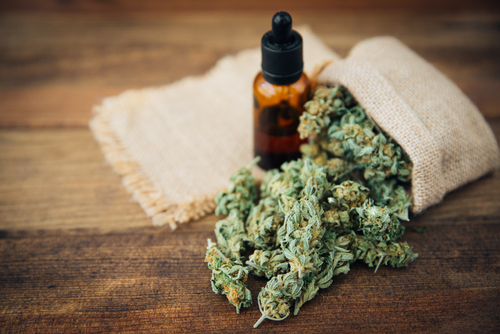Hello ladies and gents this is the Viking telling you that today we are talking about
CBD OIL
1. CBD is legal, but only if it's derived from hemp
To anyone unfamiliar with CBD, it may seem strange to see something that comes from cannabis garner such widespread attention and acceptance across the U.S.. Following the passage of the 2018 Farm Bill, CBD derived from industrial hemp, defined as cannabis with less than 0.3% THC, is not a controlled substance under federal law. CBD from marijuana or hemp with more than 0.3% THC is still considered illegal federally, but legal in states where medical and adult-use cannabis is permitted. The laws vary significantly from state to state, however, so it's best to double check. For example, Idaho and South Dakota still consider CBD illegal.
2. CBD is psychoactive, but also non-intoxicating
One of the major CBD selling points to come out of the compound's recent product boom is that the cannabinoid is both therapeutic and “non-psychoactive,” as opposed to the extraordinarily psychoactive THC. While you might commonly read this “fact” about CBD, it isn't accurate to say that CBD is devoid of any psychoactive effects.
CBD ispsychoactive in the sense that it directly affects mental processes of cognition and mood. CBD's most well-known psychoactive effect is the calming feeling frequently associated with the cannabinoid. CBD is, however, non-intoxicating, which means it doesn't produce the “high” of THC. THC is also psychoactive, but because its effects can leave consumers temporarily impaired, it is intoxicating. The non-intoxicating qualities of CBD are what cause some to consider it a “non-psychoactive” cannabinoid.
CBD oil usually comes with a dropper to allow consumers and patients to measure out their dose.
3. CBD generally works better with other cannabis compounds
A 2015 study from The Hebrew University of Israel documented the medicinal potency of single-molecule CBD extract versus that of a whole-plant, CBD-rich extract. Single molecule extract is an isolated extract of a single compound, such as CBD. A whole-plant extract essentially preserves the full cannabinoid and terpene profile of the original plant.
The study concluded that whole-plant, CBD-rich extract had a superior therapeutic value to single-molecule CBD extract. Though there may be cases, depending on an individual patient's condition and physical restrictions, where a CBD isolate is a more appropriate prescription, a whole-plant, high-CBD product has the advantage of working in tandem with other potentially therapeutic cannabinoids and terpenes. This synergistic relationship is commonly referred to as the entourage effect. For instance, some studies have demonstrated CBD's ability to minimize the undesirable effects of THC, including paranoia and cognitive impairment.
4. CBD interacts with several systems in the body
One major explanation for CBD's wide range of potential benefits is the complex way it interacts with our bodies, particularly through the endocannabinoid system (ECS), an internal system made up of endogenous cannabinoids, or endocannabinoids, the receptors that these cannabinoids bind to, and the enzymes that break them down. CBD and other phytocannabinoids, or cannabinoids produced by the cannabis plant, bind to cannabinoid receptors when they enter the body, and elicit a wide range of effects, depending on which receptors they activate.
Research suggests that CBD may reduce absorption of the body's pain-regulating endocannabinoid anandamide, which could lead to pain relief. CBD has also been shown to reduce epileptic seizures by inhibiting the release of neurotransmitters.
CBD also elicits therapeutic responses from the body through non-ECS receptor pathways. For example, CBD may activate serotonin receptor 5-HT1A in mice, making it potentially helpful in treating depression and anxiety. It may also suppress chronic pain and inflammation by targeting alpha-3 glycine receptors according to research conducted on rodents.
5. Not all CBD oil is the same
Those who have had limited experience shopping for CBD oil may wonder where to start, or how to find a quality product. Firstly, understand that marijuana and industrial hemp are both common CBD oil sources. There are also several types and formulas on the market, which typically fall into one of three categories:
- Full Spectrum contains the full spectrum of CBD, minor cannabinoids, cannabis-derived terpenes, and trace amounts of THC found in the plant.
- Broad Spectrum contains a full spectrum of extracted cannabinoids and terpenes, but with trace amounts of THC removed.
- Isolate is pure CBD with all other cannabis compounds removed until only a powdered or crystalline form of CBD remains.

Comments
Post a Comment